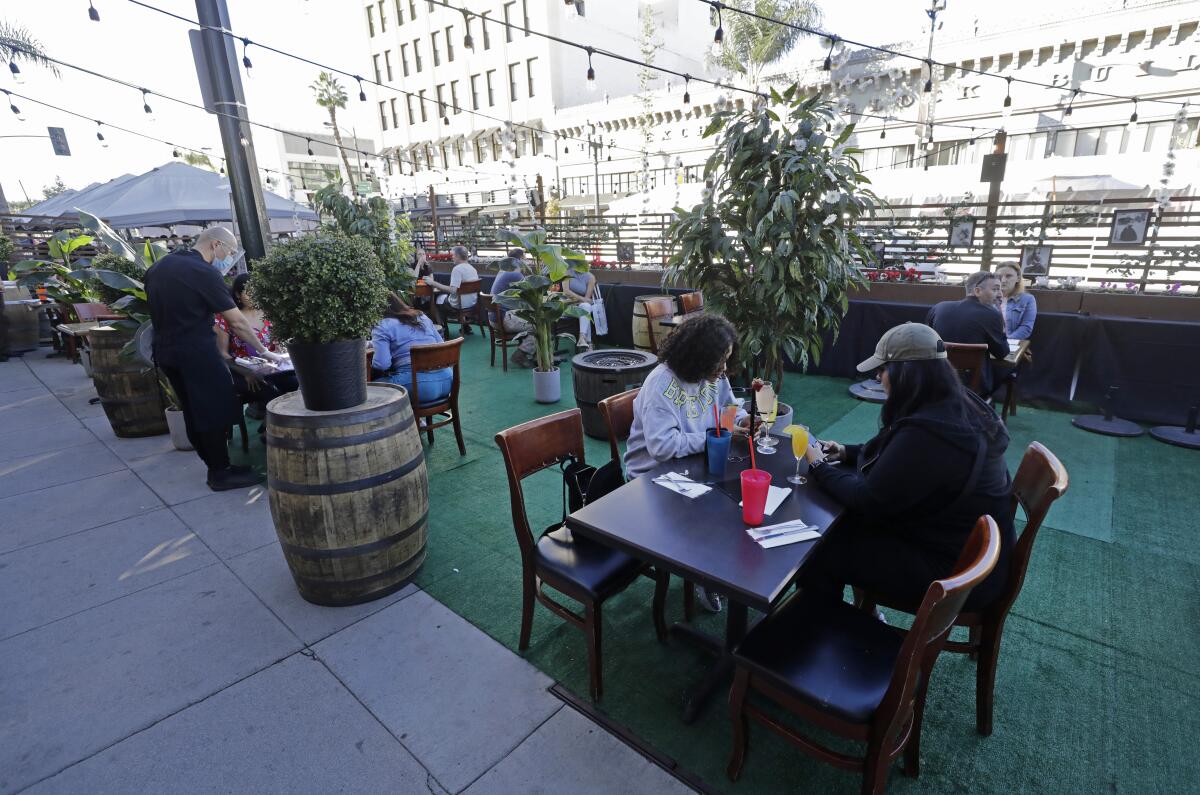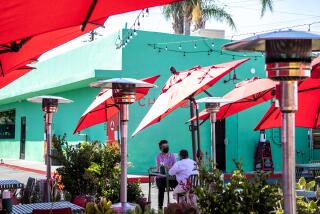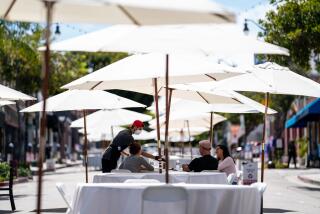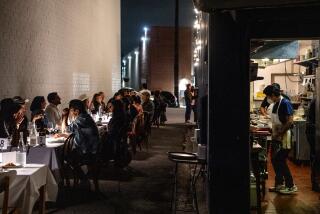Column: Does L.A. County’s crackdown on outdoor dining go too far?

Did Los Angeles County officials go too far last week in banning outdoor dining to help control the spread of the coronavirus?
“I could go on a really long rant,” said a seventh-grade lad named Charles who was enjoying a lunch break Tuesday afternoon with his father, Tim, outside the Slater’s 50/50 burger restaurant in the heart of Old Town Pasadena. That city has its own health department, sets its own rules and still allows outdoor dining — for now.
The waitress who took their order wore a mask and face shield, and the nearest table was about eight feet away. Charles argued that government operates on tax revenue, and restaurants generate a lot of it. So as long as people play it safe, what’s the problem?
“We always wear masks and distance, and we’re about to go wash our hands now,” said his father, who added that he doesn’t think restaurants are any riskier than other gathering places that were not shut down, like supermarkets and other stores.
On the one hand, I agree with them. And I feel for restaurant owners and their tens of thousands of employees, many of whom live on the edge even in normal times.
On the other hand, L.A. County and California are breaking daily records for new coronavirus cases, and hospitals are in danger of being overwhelmed at the current rate. And a lot of that is directly related to the fact that too many people have either let down their guard or remain openly defiant toward calls to mask up, sanitize and socially distance.
I ran into one such person in Pasadena when I approached two women who were dining alfresco on Colorado Boulevard, a God-given right here in the land of 70-degree December days. I politely asked what they thought about the dining restrictions imposed in other parts of the county, and one of the women nearly spit her food at me.
“You’re wearing a mask, I’m not,” she growled, suggesting that people like me were responsible for a national overreaction to the pandemic.
“You’re the problem,” she said, telling me to take my newspaper “and shove it.”
Happy holidays to you, too. And actually, I’m not the problem. The problem is stubborn resisters who think of themselves as patriots for refusing to make a small sacrifice in the interest of others.
Did you see the op-ed last week by emergency room doctor Mark Morocco, who wrote about the risks to frontline medical staff and pleaded with people to play it safe for everyone’s benefit? Morocco is a longtime pal of mine, all the way back to his days in medical school, and I worry about him and all his colleagues.
But I also worry about how many people will lose their businesses or get so far behind on the rent or mortgage that they never catch up.
“I’m just really torn,” said Jocelyn Ramos, who owns one of my favorite restaurants, La Cabañita in Montrose. Ramos has had to furlough about three dozen employees. “I understand the need to get ahead of this, but I see other places people are still going to, like stores, and they’re packed.”
I’ve been checking in periodically during the pandemic with two servers from Art’s Delicatessen & Restaurant in Studio City, and Tony Castro and Tina Smith say they’re still surviving but struggling. They told me Tuesday morning that they had been picking up a couple of shifts serving outdoor tables and might resort to food delivery jobs to supplement unemployment insurance.
Dina Samson, owner of Rossoblu in the Arts District, said she invested $20,000 in an outdoor dining tent, lighting and furnishings, adding to the restaurant’s losses. And her staff of several dozen employees is now down to a handful.
“We understand that COVID is crazy right now, and we don’t want to argue for reopening,” said Samson. But when the current three-week ban on outdoor dining comes to a close, she said, she and other owners want to make sure they’re a part of conversations about when it’s safe to reopen.
Caroline Styne, who owns A.O.C., the wine bar and restaurant on West Third Street in Los Angeles, said she is not convinced that outdoor dining has contributed significantly to the spread of the virus.
“We take temperatures at the door, and tables were six feet apart, but now they’re eight feet,” Styne said, and her employees wear masks and face shields. “We’re not allowing guests to move through the restaurant without masks, and we’ve limited the amount of time they’re allowed to be at a table.”
Meanwhile, she said, people have gathered in other places — for parties celebrating Halloween, Thanksgiving, the Dodgers and Lakers championships — without honoring safety protocols. All those things have contributed to the virus more than outdoor dining has, Styne said.
That’s an argument also made by County Supervisor Kathryn Barger, who opposed the outdoor dining ban that was approved by the board 3 to 2, with Supervisor Janice Hahn also dissenting.
“Contact tracing does not show a significant connection between restaurants and community transmission,” Barger stated in an email sent to me Tuesday afternoon by her office. “COVID-19 cases traced back to the county’s restaurants and bars accounted for just 3.1%, or 70 of the 2,257 confirmed outbreaks.”
Barger argued that in the first few months after outdoor dining was permitted in July, positivity rates and hospitalizations declined.
Dr. Sharon Balter, director of acute communicable disease control for Los Angeles County, offered a different perspective. She told me that she and other officials in the Public Health Department “feel horrible” about the hardships of restaurant owners and their employees and customers, “but this was not done lightly,” and restaurants haven’t been singled out as potential spreaders.
The temporary ban on outdoor dining was not based on contact tracing that identified restaurants as spreaders, Balter said. It was based on the fact that cases are rising, that viruses often spread faster and invade the body more easily in colder weather and that even with proper table spacing, taking off your mask to dine — sometimes in the company of people outside your own household — is a risk.
“There does appear to be a seasonal effect ... in the U.S. and elsewhere in the world, and on balance, now seemed like the right time to pause outdoor dining,” Balter said.
As for the argument that supermarkets can be more crowded than outdoor restaurants, Balter noted that you don’t take off your mask to shop for groceries — you put it on.
I’m conflicted, because I think the restaurant owners and the health experts both make good arguments. Just to be safe, I haven’t been to a restaurant since the pandemic began. I do order takeout a couple of times a week, to support my favorite restaurants.
But there’s another way to support restaurants and their employees, and other businesses.
“It’s unfortunate that the choice is between health and economic survival,” said Balter, suggesting that the bigger question is why we haven’t thrown another lifeline to employers and their employees since the first stimulus offering several months ago.
County officials did announce Tuesday that a grant program could make up to $30,000 in aid available to some, but not all, restaurants in the county.
Restaurateur Styne seconded that motion, calling for Washington to step up.
“Restaurants would be OK with temporarily closing down for the greater good,” she said, “if Congress would pass a stimulus package and get all these small businesses and their employees the relief we need, so we can close, and everybody can get through this without all being sent to the poorhouse.”
I’ll drink to that.
More to Read
Sign up for Essential California
The most important California stories and recommendations in your inbox every morning.
You may occasionally receive promotional content from the Los Angeles Times.











